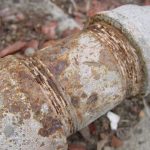Avoid Damage from High Water Pressure
If your shower and sinks seem to have irregular
water pressure or it seems to be very strong, it could be a sign that the water pressure entering your home is too high. Although this can make for a fantastic shower, it could be costing you. Not only on your water bill, but high water pressure could be putting greater strain on the pipes, toilets, washers all increasing the chance of leaks developing. Fortunately, there is a potential solution: a pressure regulator.
The Consequences of High Water Pressure
The most common consequence of high water pressure is leaking. Typically, high pressure will cause small pinhole leaks that may appear at intermittent times. Unfortunately, even a small leak can cause major problems, especially if it is in an area where it can damage the floor or walls. High or inconsistent water pressure can also cause additional stress on water using appliances such as hot water heaters, dishwashers or washing machines, compromising the lifespan of the unit.
The Cause
High water pressure is often a result of where your home is located. Since water naturally runs downhill, if you live at the bottom of an incline, it could impact your water pressure. Your utility company may also elevate the water pressure to meet the requirements of fire hydrants or tall buildings in your neighborhood. High pressure can also be triggered by thermal expansion within your home. The water volume could be changed because of being heated by a powerful water heater.
Diagnosing High Water Pressure
The simplest way to diagnose if your water pressure is too high is with basic observation. If the water seems to have excessive pressure when it flows into your sink, it could be worth checking. Another indicator of a potential problem is a banging noise in the pipes. This noise, often called a water hammer, can occur at different times of the day or night.
A sure way to tell if you have high water pressure is to use a pressure gauge. This can be screwed on to the outlet hose or the faucet nearest your water meter. Most domestic plumbing systems are equipped to handle up to 80 psi water pressure, so if the meter is reading higher pressure, you may need to correct it. The pressure can fluctuate at different times of the day, so take multiple readings to obtain a full picture of the situation.
Correcting the Problem
Even if your home has intermittent high water pressure, it could be a good idea to install a pressure regulator. This device is installed on the main water line and will slow the water flow to keep the pressure down to a reasonable level. This can help you save excessive wear and tear on your plumbing fixtures and pipes, while saving on your water bill. Although there are a number of models of pressure regulators which can be fitted by DIY enthusiasts, it is best to consult a
qualified plumber to diagnose a pressure problem and provide you with a solution best suited to the particular requirements of your home.
By Giovanni Longo President Flood Brothers Plumbing
Giovanni Longo is a 3rd generation master plumber who has been practicing his craft and trade in the greater Los Angeles area for well over a decade and a half. A plumbing and hydraulics-engineering innovator, Giovanni’s particular world-class expertise focuses on dealing with challenging sewer system designs as well as resolving complex commercial and residential draining issues. As a certified Flood Mitigation expert, he is also well versed in a wide variety of water damage and remediation solutions.





